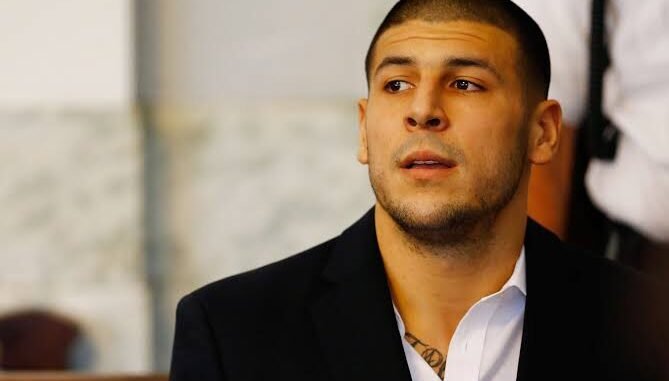
Introduction

Aaron Hernandez’s story shocked the sports world. He rose quickly as a talented NFL star, yet his life collapsed in crime, controversy, and tragedy. Fans still ask: What really happened? When did Aaron Hernandez die? And most importantly, what was the cause of his death?
This article explains his life journey, his legal downfall, and the details surrounding his death. It also highlights how brain injuries and mental struggles shaped his actions.
1. Early Life and Rise to Fame
Aaron Josef Hernandez was born on November 6, 1989, in Bristol, Connecticut. From an early age, he displayed raw athletic talent. At Bristol Central High School, he dominated on the football field and earned national recognition.
He continued his success at the University of Florida. In 2009, he won the BCS National Championship with the Gators. His speed, size, and ability to make big plays drew NFL scouts’ attention.
In the 2010 NFL Draft, the New England Patriots selected him in the fourth round. Alongside Rob Gronkowski, Hernandez helped create one of the league’s most dangerous tight end duos. He reached the Super Bowl in just his second season, cementing his spot as a rising star.
2. Legal Troubles Begin
Despite his success, trouble followed Hernandez off the field. His circle of friends included people involved in crime. Reports suggested that he often displayed aggression and had difficulties controlling his temper.
On June 26, 2013, police arrested him for the murder of Odin Lloyd, a semi-professional football player who dated his fiancée’s sister. The shocking news ended his NFL career instantly. The Patriots released him the same day.
In April 2015, a Massachusetts jury found Hernandez guilty of first-degree murder. The court sentenced him to life in prison without parole. His case stunned fans who once saw him as one of football’s brightest young stars.
3. When Did Aaron Hernandez Die?
Aaron Hernandez died on April 19, 2017, at age 27. Prison officials at Souza-Baranowski Correctional Center in Massachusetts discovered him hanging in his cell during morning rounds.
His sudden death came just days after his acquittal in a separate double homicide case. Many wondered why he would take his own life after a legal victory.
4. Cause of Death – Suicide by Hanging
The medical examiner ruled his death a suicide by hanging. Hernandez tied a bedsheet to his prison cell window and used it to end his life. He also jammed the door with cardboard to prevent guards from entering.
Investigators found three suicide notes in his cell. One note was written for his fiancée, another for his young daughter, and one for his lawyer. He also wrote “John 3:16” on his forehead with red ink and left his Bible open to the same verse.
Toxicology tests revealed no drugs in his system. The final report confirmed the cause as asphyxia due to hanging.
5. Why Did He Do It?
The exact reasons remain debated. Some experts believe he wanted his conviction vacated under Massachusetts law. At the time, if a person died while appealing their case, the conviction could be erased. This might have allowed his family to gain financial benefits from lawsuits against the Patriots or the NFL.
Others point to his mental health. Hernandez lived under extreme stress—serving life in prison, missing his daughter’s childhood, and facing national shame. His struggles with identity, violence, and personal demons added to his despair. Aaron Hernandez death cause.
6. The Role of CTE in His Death
After his death, researchers examined Hernandez’s brain. They found one of the most severe cases of chronic traumatic encephalopathy (CTE) ever seen in a young athlete.
CTE develops from repeated head trauma. Symptoms include memory loss, mood swings, poor impulse control, and violent behavior. Doctors said Hernandez’s brain damage could have affected his judgment and actions.
His family later sued the NFL and the Patriots, claiming football-related brain injuries contributed to his downfall. The case raised awareness about the hidden dangers of repeated concussions in professional sports.
7. Aftermath of His Death
Hernandez’s death created legal and cultural ripples. Initially, a court vacated his murder conviction because of the abatement ab initio rule. This meant that legally, he was no longer guilty of Odin Lloyd’s murder. However, in 2019, the Massachusetts Supreme Court reinstated the conviction after appeals from prosecutors and the victim’s family.
His story continues to spark debate about justice, responsibility, and the NFL’s role in player health.
Media outlets, documentaries, and TV shows have explored his life. Netflix released Killer Inside: The Mind of Aaron Hernandez, which examined his career, trial, and mental health. FX also created a dramatized series highlighting his upbringing, sexuality struggles, and eventual downfall. Aaron Hernandez death cause.
8. Lessons From His Story
Aaron Hernandez’s life illustrates how fame, violence, and unaddressed mental struggles can collide with tragic results. His story serves as a warning about:
-
The dangers of ignoring mental health in athletes.
-
The destructive effects of toxic environments and poor choices.
-
The need for better awareness of CTE in football and other contact sports.
His daughter, Avielle, now grows up with the memory of a father who once had everything yet lost it all. Aaron Hernandez death cause.
FAQs
Q1: When did Aaron Hernandez die?
A1: He died on April 19, 2017, in his prison cell at age 27.
Q2: What was Aaron Hernandez’s death cause?
A2: His death cause was suicide by hanging, confirmed by the medical examiner.
Q3: Did drugs play a role in his death?
A3: No. Toxicology tests showed no drugs or alcohol in his system at the time of his death.
Q4: What did he leave behind?
A4: He left three suicide notes for his fiancée, daughter, and lawyer, along with religious writings.
Q5: Did Aaron Hernandez suffer from CTE?
A5: Yes. Doctors found one of the most severe cases of CTE ever seen in someone his age.
Q6: Was his murder conviction erased?
A6: It was briefly vacated after his death, but reinstated by the Massachusetts Supreme Court in 2019.
Q7: How has his story been told in media?
A7: His life has been covered in documentaries, including Netflix’s Killer Inside and FX’s drama American Sports Story.
Conclusion
Aaron Hernandez’s rise and fall remain one of the most shocking stories in sports. He went from NFL stardom to life imprisonment, and finally to suicide at age 27. The official cause of death—suicide by hanging—only deepened the tragedy.
Yet, his case also revealed the hidden dangers of CTE and the importance of mental health support for athletes. While his crimes should never be forgotten, his death serves as a stark reminder of how quickly greatness can unravel when pain, violence, and untreated trauma take control.
